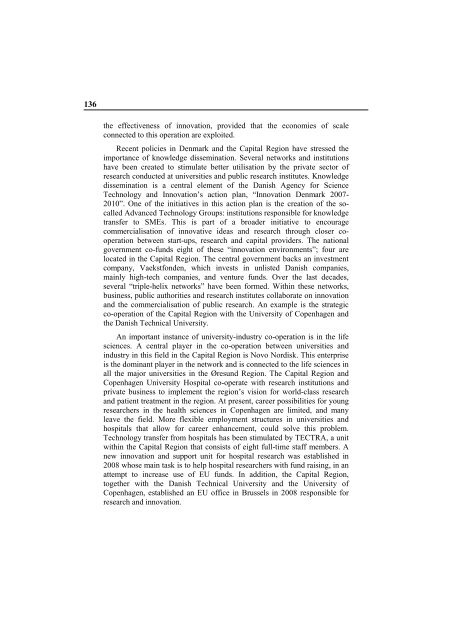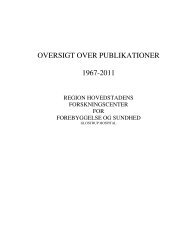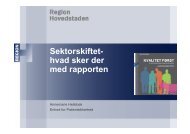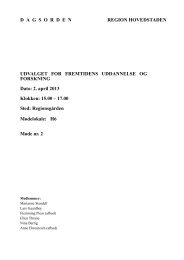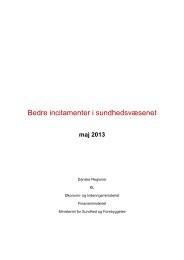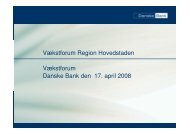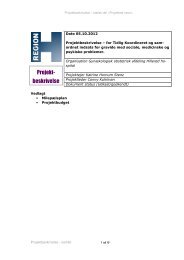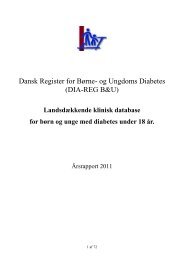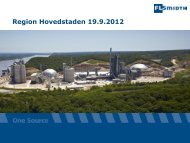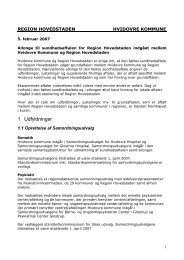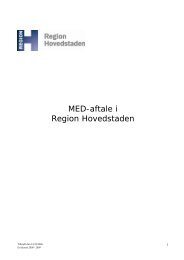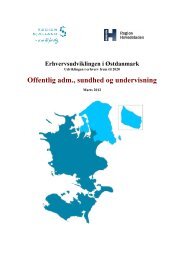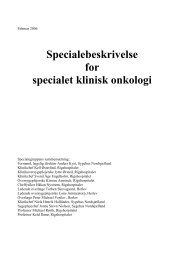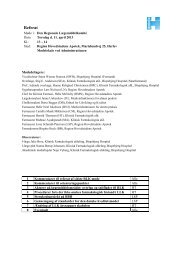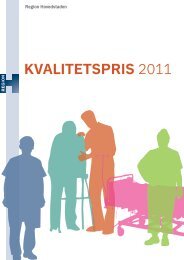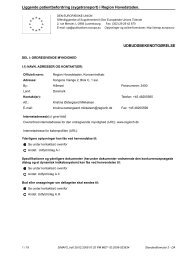Territorial Review Copenhagen - Region Hovedstaden
Territorial Review Copenhagen - Region Hovedstaden
Territorial Review Copenhagen - Region Hovedstaden
You also want an ePaper? Increase the reach of your titles
YUMPU automatically turns print PDFs into web optimized ePapers that Google loves.
136<br />
the effectiveness of innovation, provided that the economies of scale<br />
connected to this operation are exploited.<br />
Recent policies in Denmark and the Capital <strong>Region</strong> have stressed the<br />
importance of knowledge dissemination. Several networks and institutions<br />
have been created to stimulate better utilisation by the private sector of<br />
research conducted at universities and public research institutes. Knowledge<br />
dissemination is a central element of the Danish Agency for Science<br />
Technology and Innovation‘s action plan, ―Innovation Denmark 2007-<br />
2010‖. One of the initiatives in this action plan is the creation of the socalled<br />
Advanced Technology Groups: institutions responsible for knowledge<br />
transfer to SMEs. This is part of a broader initiative to encourage<br />
commercialisation of innovative ideas and research through closer cooperation<br />
between start-ups, research and capital providers. The national<br />
government co-funds eight of these ―innovation environments‖; four are<br />
located in the Capital <strong>Region</strong>. The central government backs an investment<br />
company, Vaekstfonden, which invests in unlisted Danish companies,<br />
mainly high-tech companies, and venture funds. Over the last decades,<br />
several ―triple-helix networks‖ have been formed. Within these networks,<br />
business, public authorities and research institutes collaborate on innovation<br />
and the commercialisation of public research. An example is the strategic<br />
co-operation of the Capital <strong>Region</strong> with the University of <strong>Copenhagen</strong> and<br />
the Danish Technical University.<br />
An important instance of university-industry co-operation is in the life<br />
sciences. A central player in the co-operation between universities and<br />
industry in this field in the Capital <strong>Region</strong> is Novo Nordisk. This enterprise<br />
is the dominant player in the network and is connected to the life sciences in<br />
all the major universities in the Øresund <strong>Region</strong>. The Capital <strong>Region</strong> and<br />
<strong>Copenhagen</strong> University Hospital co-operate with research institutions and<br />
private business to implement the region‘s vision for world-class research<br />
and patient treatment in the region. At present, career possibilities for young<br />
researchers in the health sciences in <strong>Copenhagen</strong> are limited, and many<br />
leave the field. More flexible employment structures in universities and<br />
hospitals that allow for career enhancement, could solve this problem.<br />
Technology transfer from hospitals has been stimulated by TECTRA, a unit<br />
within the Capital <strong>Region</strong> that consists of eight full-time staff members. A<br />
new innovation and support unit for hospital research was established in<br />
2008 whose main task is to help hospital researchers with fund raising, in an<br />
attempt to increase use of EU funds. In addition, the Capital <strong>Region</strong>,<br />
together with the Danish Technical University and the University of<br />
<strong>Copenhagen</strong>, established an EU office in Brussels in 2008 responsible for<br />
research and innovation.


